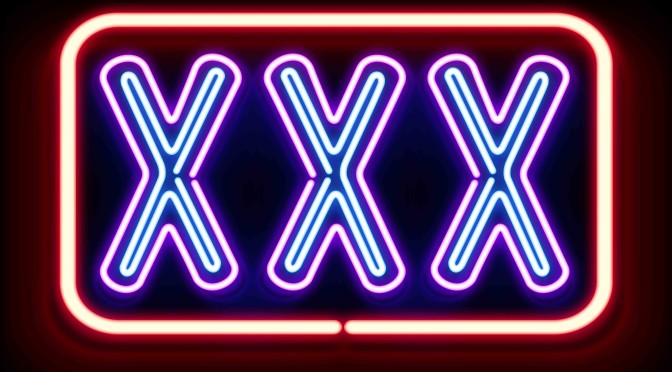EMERGING FEMINISMS, When Being Sex Positive Isn’t Enough
By Chloe Sariego
Since binaries are so early 2000s, I’m increasingly less interested in “pro” and “anti” porn debates. I’ve been a pro-porn feminist for most of my young feminist-hood, and for a long time, porn was a small and insignificant part of my life. I supported my friends who did sex work, I argued with Sex Work Exclusionary Radical Feminists (SWERFS), I made my family uncomfortable by blatantly advocating against censorship, but my own consumption of porn remained uncritical. Being sex-positive meant I supported all porn, on all websites, with a shockingly uncritical eye. While de-stigmatizing porn and sex-work is important, not all porn on the internet aligns itself with sex-positive values. Holding these contradictory factors can feel tricky and invoking the wisdom of Foucault, I propose a re-centering of the conversation from porn’s morality to the way in which porn is created.
In The History of Sexuality, Foucault (1976) argues that sexuality is not a natural occurrence. The “inherence” of sex’s morality is not interesting to him. Instead, he argues that it is a constructed category of experience which has “historical, social and cultural, rather than biological, origins” (Spargo, 199: 12). In his theory of “confessions,” the individual, through speaking, produces narratives about sexuality as if they are “truth” and are therefore “not found, but produced” (ibid: 15). If confession is what produces sexuality, not the other way around, is porn not a formalized, visual confession? The question, then, is not what is inherent about pornography (like sexuality- nothing is), the question is, “how did power circulate through the production of knowledge about sex?” (ibid: 8). If porn is one of the main modes in which sex is visually produced, then we cannot condemn porn itself but it’s production.
Often, anti-porn radical feminists critique porn’s reproduction of patriarchal structures by highlighting the way women are represented, treated, and controlled in pornographic content. Invoking Foucault, however, we can re-contextualize the harmful aspects of porn as an effect of the social context in which it is being created and consumed, not a product of porn in and of itself. On the contrary, porn is a medium for said social context to be reconsidered.
In Power/Knowledge, Foucault makes a strong case for resistance within a mode of power, “[T]here are no relations of power without resistances… resistance to power does not have to come from elsewhere to be real, nor is it inexorably frustrated through being the compatriot of power” (Foucault, 1980: 795). Resistance can be inside of power, not separate or external like legislation and censorship. This is why condemnations of porn as the product of power relations or revering porn as solely a subversive success are both, in a Foucauldian concept, misunderstandings of power. Foucault’s idea of power and discourse can help us understand pornography’s contradictory factors: it’s oppressive subversion and reclamation of power structures within power structures. As with other aspects of human behavior, the concrete institutional forms of sexuality at any given time and place are products of human activity (Spargo, 1999). They are inundated with conflicts of interest and political situating, both purposeful and incidental. When porn is made it is negotiating all of the power structures that exist in sex. By nature of it being created, however, it provides potential for re-negotiation, subversion, and new forms of expression that aren’t available in other places (academia, for one).
If we agree to understand porn in the framework of a power re-negotiation, the only “ethical” thing to do, as consumers, is to make sure we are supporting porn that makes this negotiation.
Why, then, are pro-porn feminists watching such shitty porn? Shitty porn, on shitty websites, that is produced in often-shitty conditions. The gigantic buckets of internet porn that exist in the often racist sections of a free porn sites “categories” page is saturating the market and pushing bad-ass women who self-publish (see, for instance, Sinnamon Love) out. If you’re going to buy vegan leather, pay extra for fair trade coffee, or consider yourself a consumer “activist” you could move a few bucks from cigarettes to starting a porn collection. I understand that not everyone can buy their porn, and if that’s the case, take some care to research some production companies that are ethical and free. I know it’s not easy. It’s not like there’s an “ethically filmed” label that can be slapped onto a video like a carton of organic eggs—but perhaps there should be.
Internet porn is an industry saturated by two or three main websites that stream endless amounts of “free” porn, except it isn’t free. Whenever the market allows free consumption, that discount ends up on someone else’s shoulders. More often than not it’s at the porn actors expense. If we’re talking about “ethical” consumption of porn it’s time to stop worrying about porn’s moral implications and move towards supporting pornographers who make porn that incorporates safe working conditions, pays actors a fair wage, and incorporate a healthy and consent-filled environment for performers to express themselves.
I’ve spent most of my adult life treating porn like a blank space. Porn didn’t have implications on my personality, my social life, or my political alignments. I could watch whatever porn I wanted because it was just porn—easy Internet porn that satisfied a momentary itch and hey! I’m not a SWERF! I’m pro sex! But simply being sex positive isn’t enough. We need to hold ourselves and each other to the same personal, political, and social standards that we extend when buying groceries. Indie-ethical porn is like the fair-trade version of the pornography grocery store—if you can afford it, you should be buying it accountably.
 Chloe Sariego is a writer and college student in New York studying economics, law, and sociology with a focus on critical theory. In her spare time, she performs on the award winning improv team Feral Christine and runs around being too earnest for her own good. You can keep up with her at @chloesariego.
Chloe Sariego is a writer and college student in New York studying economics, law, and sociology with a focus on critical theory. In her spare time, she performs on the award winning improv team Feral Christine and runs around being too earnest for her own good. You can keep up with her at @chloesariego.





0 comments